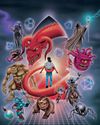
IN THE EARLY 1990S, I was a reporter at the Washington Post. Having just turned 30, I was the "young" person in the newsroom, so when the digital-media start-ups appeared, I got what many reporters looked at as the short end of the beat. They had no interest in understanding the massive changes that were happening. As I learned more, it often fell to me to explain what this newfangled internet was as if I were trying to explain a tree to a child.
The Post did give me the space to report on a broad range of digital topics, largely because no one else would-including the many come-and-gone technologies, like CD-ROMS, that were heralded as "multimedia killers" but would soon be killed themselves.
During that period, I made one prediction that started coming true much more quickly than even I expected. This was about the end of old media, starting with the destruction of one of its most important economic pillars: the classified ads in newspapers.
In 1995, a quirky programmer in San Francisco named Craig Newmark started emailing friends a list of local events, job opportunities, and things for sale. The next year, he turned Craigslist into a web-based service and eventually started expanding it all over the country and the world.
It was clear this list was a giant killer, and I told everyone who would listen to me at the Post that we needed to put all the money, all the people, and all the incentives into digital. I insisted that the bosses had to make readers feel like digital was the most important thing. But the bosses never did because the business they knew was the physical paper. I relayed my worries about the turtle pace of digital change many times to the Washington Post Company's affable CEO, Don Graham, the son of legendary publisher and surprisingly entertaining badass Katharine Graham. Don Graham was inexplicably humble and even sheepish about his power.
This story is from the {{IssueName}} edition of {{MagazineName}}.
Start your 7-day Magzter GOLD free trial to access thousands of curated premium stories, and 9,000+ magazines and newspapers.
Already a subscriber ? Sign In
This story is from the {{IssueName}} edition of {{MagazineName}}.
Start your 7-day Magzter GOLD free trial to access thousands of curated premium stories, and 9,000+ magazines and newspapers.
Already a subscriber? Sign In

LIFE AS A MILLENNIAL STAGE MOM
A journey into the CUTTHROAT and ADORABLE world of professional CHILD ACTORS.

THE NEXT DRUG EPIDEMIC IS BLUE RASPBERRY FLAVORED
When the Amor brothers started selling tanks of flavored nitrous oxide at their chain of head shops, they didn't realize their brand would become synonymous with the country's burgeoning addiction to gas.

Two Texans in Williamsburg
David Nuss and Sarah Martin-Nuss tried to decorate their house on their own— until they realized they needed help: Like, how do we not just go to Pottery Barn?”

ADRIEN BRODY FOUND THE PART
The Brutalist is the best, most personal work he's done since The Pianist.

Art, Basil
Manuela is a farm-to-table gallery for hungry collectors.

'Sometimes a Single Word Is Enough to Open a Door'
How George C. Wolfein collaboration with Audra McDonald-subtly, indelibly reimagined musical theater's most domineering stage mother.

Rolling the Dice on Bird Flu
Denial, resilience, déjà vu.

The Most Dangerous Game
Fifty years on, Dungeons & Dragons has only grown more popular. But it continues to be misunderstood.

88 MINUTES WITH...Andy Kim
The new senator from New Jersey has vowed to shake up the political Establishment, a difficult task in Trump's Washington.

Apex Stomps In
The $44.6 million mega-Stegosaurus goes on view (for a while) at the American Museum of Natural History.